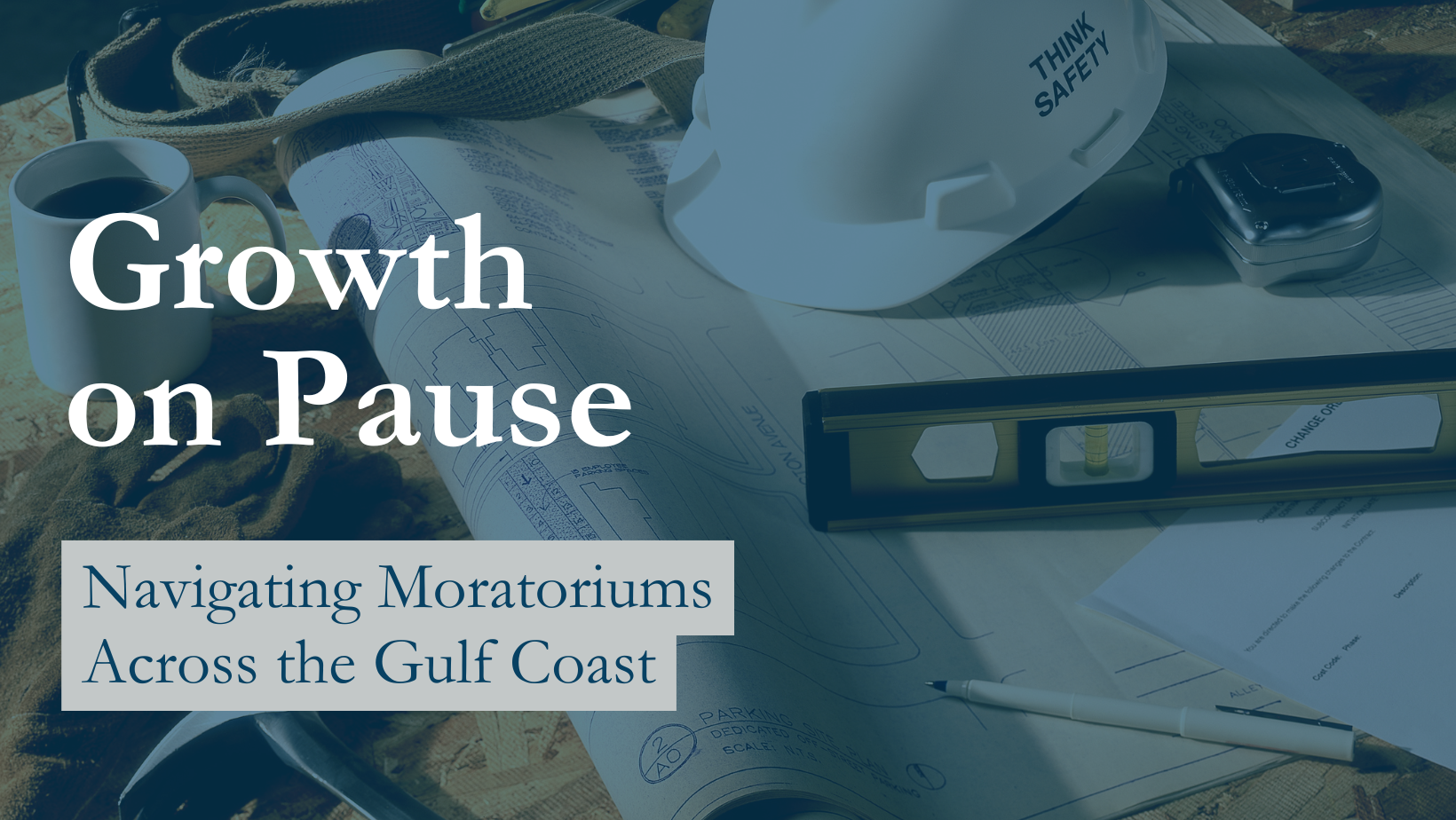Growth on Pause: Navigating Moratoriums Across the Gulf Coast

Summary
As Gulf Coast communities experience rapid growth, many municipalities are turning to temporary building moratoriums to pause and reassess development. Cities like Foley, Fairhope, Orange Beach, and others in Alabama—and even Oak Hill and Edgewater in Florida—are using moratoriums to update zoning codes, address infrastructure capacity, and ensure smart, sustainable growth. While these pauses can cause concern for developers and business owners, they are not designed to halt progress permanently. When paired with clear goals and timelines, moratoriums become important tools to protect community resources while preparing for future development.
As communities along the Gulf Coast continue to experience rapid growth, local leaders are facing the complex task of balancing progress with preservation. One tool increasingly used to navigate this challenge is the building moratorium, a temporary pause on certain types of development aimed at addressing infrastructure, environmental, or public service concerns before allowing additional construction.
In many local communities, moratoriums have become part of the planning conversation. But what do these moratoriums mean for developers, business owners, and residents—and how can we ensure they’re not just pauses, but purposeful pathways forward?
What Is a Moratorium?
A moratorium is a temporary halt on new development, typically residential or commercial permits, and is used to give municipalities time to evaluate or update zoning codes, improve infrastructure, or address public service capacity (such as schools, roads, or utilities). Not meant to be indefinite, moratoriums, by law, must have clear start and end dates, with actionable goals in place during the pause. This pause enables local governments to:
- Review and update zoning, land-use plans, and infrastructure
- Address public concerns such as traffic, environmental, utility capacity, etc.
Ensure growth is sustainable, equitable, and aligned with comprehensive plans
A Snapshot of Local Communities Taking Action
Across Baldwin County, AL, and the surrounding Gulf Coast region, several municipalities have implemented moratoriums as growth accelerates:
- Foley, AL: In February 2024, Foley enacted a six-month moratorium on multi-family housing permits to reassess zoning and density. City officials cited the need for updated infrastructure and traffic planning to keep pace with growth. The moratorium was extended through August 2025 to allow time for final recommendations and implementation of new policies.
Fairhope, AL: Fairhope adopted a temporary moratorium in late 2023 on new subdivisions and certain commercial projects within its extraterritorial jurisdiction (ETJ). The city is using the time to complete a comprehensive update to its land-use plan and subdivision regulations. The moratorium is set to expire in early 2026. - Orange Beach, AL: Orange Beach placed a pause on new large-scale developments in mid-2024 to evaluate the environmental impact of ongoing projects and their alignment with the city’s updated comprehensive plan. The moratorium, which applies to multi-family and some commercial developments, will remain in effect through early 2026.
- Oak Hill, FL (Volusia County): Facing rapid residential development with five large planned unit developments poised to double its population, Oak Hill enacted a one-year moratorium on new RPUD applications in October 2024. The goal was to give the city time to hire and train staff capable of managing the upcoming permitting and inspection load.
- Edgewater, FL (Volusia County): In late 2024, the city approved two moratorium ordinances—one citywide and another focused on the Florida Shores drainage basin to pause rezonings, annexations, site plans, and plats. In April 2025, this was modified to a No-Fill Moratorium, restricting fill-dependent development while broader planning continues.
Why Moratoriums Matter
Moratoriums aren’t designed to stop growth. They’re intended to guide smart, sustainable development by giving cities time to ensure their infrastructure and resources can keep up. However, these pauses must be used wisely with clear objectives, transparent public input, and measurable steps toward updated policies.
Partnering for Smarter Growth
At The Highland Group, we understand both the frustration and necessity that moratoriums can bring. With experience in real estate development, preconstruction, and design-build delivery, we help our partners by working thoughtfully with city leaders, planning officials, and property owners to navigate moratoriums with clarity and foresight through:
- Upfront Strategy: We partner with stakeholders to adapt plans to evolving code environments and community objectives.
- Community Planning: We actively participate in planning conversations, offering data-driven insights.
- Proactive Collaboration: Even during moratoriums, we explore phased or compliant design alternatives for projects.
- Future-Ready Execution: Our preconstruction services prepare stakeholders so that a project regains momentum as soon as restrictions are lifted.
Purposeful Progress
Moratoriums may feel like a pause, but done right, they are a powerful tool for purposeful progress. Whether a city is recalibrating infrastructure, streamlining its permit process, or safeguarding its flood resilience, communities across the Gulf Coast are intentionally shaping tomorrow.
The Highland Group believes development is more than just building structures – it’s about building relationships, strategic frameworks, and better communities.
About The Highland Group
The Highland Group is a premier real estate development and commercial construction firm, offering expertise in preconstruction, general contracting, construction management, and design‑build delivery. We are committed to fostering trust and delivering exceptional results across the Southeastern U.S., with offices in Foley, AL; Huntsville, AL; and Panama City Beach, FL.
Learn more: www.TheHighlandGroup.com
